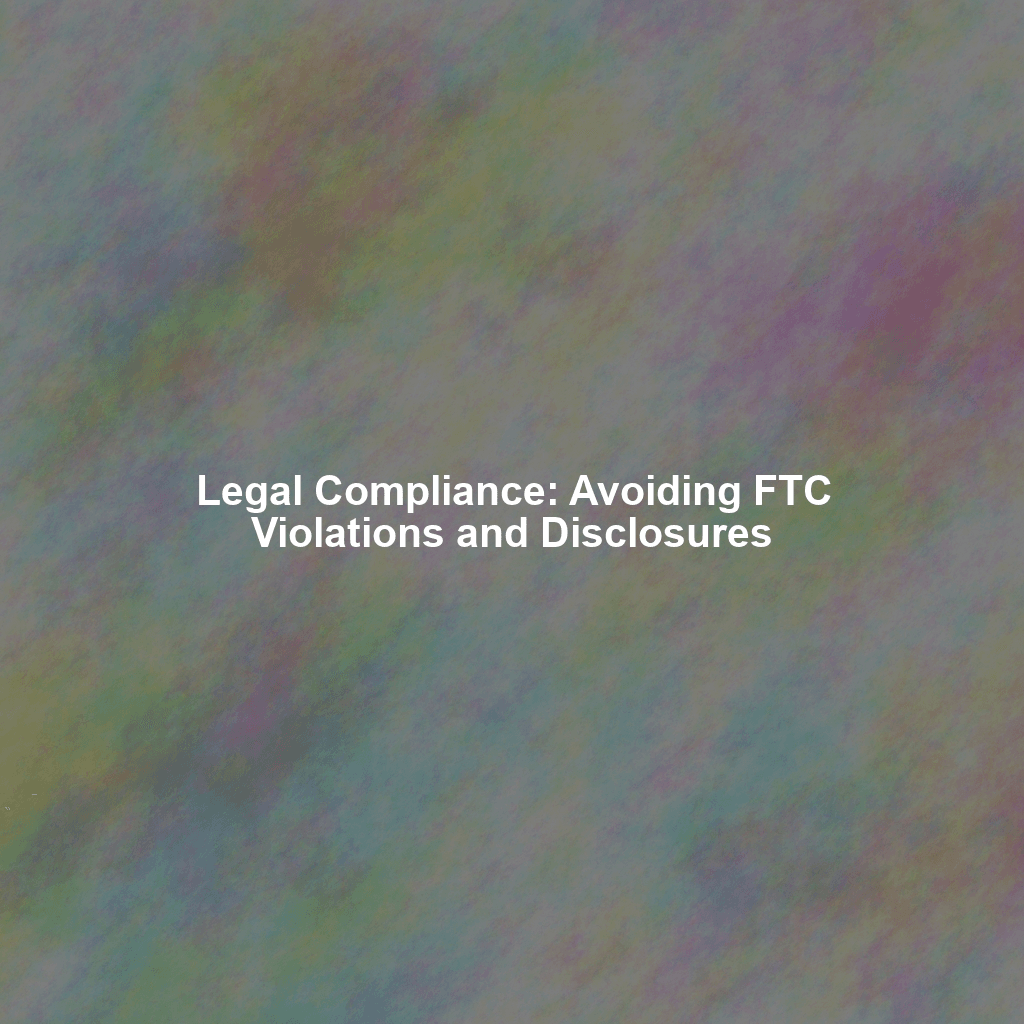Decoding the FTC: Your Guide to Legal Affiliate Marketing
Affiliate marketing is a powerful tool for generating income, but it’s also a field riddled with potential legal pitfalls. The Federal Trade Commission (FTC) has a vested interest in protecting consumers from deceptive advertising practices, and affiliate marketing falls squarely under their watchful eye. Ignoring FTC guidelines can lead to hefty fines, reputational damage, and even legal action. This article will serve as your comprehensive guide to navigating the legal landscape of affiliate marketing, ensuring you’re compliant and building a sustainable, ethical business.
Why the FTC Cares About Affiliate Marketing
At its core, the FTC’s mission is to prevent unfair or deceptive acts or practices in commerce. Affiliate marketing, where commissions are earned for promoting products or services, can easily be exploited to mislead consumers. Without proper disclosures, consumers may not realize that the content they’re consuming is actually an advertisement. This lack of transparency can influence purchasing decisions in a way that benefits the affiliate, potentially at the expense of the consumer. The FTC’s regulations aim to level the playing field, ensuring consumers have all the information they need to make informed choices.
Understanding FTC Guidelines: The Foundation of Compliance
The FTC doesn’t have specific regulations solely for “affiliate marketing.” Instead, it applies general advertising laws to the context of affiliate relationships. The key principle is transparency: consumers must be able to easily identify that a relationship exists between the endorser (you, the affiliate) and the brand being promoted.
The “Material Connection” Rule: Disclose, Disclose, Disclose!
The “material connection” is the cornerstone of FTC compliance in affiliate marketing. It refers to any relationship between the endorser and the seller that could affect the weight or credibility a consumer gives to the endorsement. This includes:
- Financial relationships: This is the most common scenario, encompassing commissions, fees, or any other form of compensation received for promoting a product or service.
- Family or personal relationships: If you’re promoting a product made by a family member or friend, that relationship must be disclosed.
- Employment relationships: If you’re employed by the company whose products you’re promoting, disclose your employment.
- Free or discounted products or services: Receiving free products or services in exchange for a review or promotion constitutes a material connection.
In short, any relationship that might influence your opinion or the way you present a product should be disclosed. The FTC assumes that consumers understand that advertisements are biased to some degree. The purpose of disclosure is to let the consumer know about any additional reasons they should take what you say with a grain of salt.
What Constitutes an Effective Disclosure?
A disclosure isn’t just about mentioning that you’re an affiliate; it’s about doing it in a way that is clear, conspicuous, and understandable. Here are some key characteristics of an effective disclosure:
- Clarity: Use straightforward language. Avoid jargon or vague terms that might confuse readers. Phrases like “I may receive compensation” or “This post contains affiliate links” are generally acceptable.
- Conspicuousness: The disclosure must be easily noticeable. It should be placed near the endorsement it relates to. Don’t bury it at the bottom of a long post or in a hidden section.
- Proximity: The closer the disclosure is to the endorsement, the better. Ideally, it should be placed before the affiliate link or recommendation.
- Placement: Disclosures should be visible without requiring the user to scroll or click. Avoid placing them in sidebars, footers, or behind drop-down menus.
- Medium-Specific Disclosures: Disclosure practices vary depending on the media used.
Website Disclosures
On a website, place disclosures at the beginning of your blog post or product review. Include them near the affiliate link itself. A simple statement like, “I may earn a commission if you purchase through this link” is effective.
Social Media Disclosures
Social media platforms require concise disclosures. Use hashtags like #ad, #sponsored, or #affiliate. These hashtags should be placed prominently within the post, not buried at the end. For video content, verbally disclose the relationship within the video and include a visual disclosure overlay.
Video Disclosures
For video content on platforms like YouTube, it’s crucial to provide both verbal and visual disclosures. Mention at the beginning of the video that you are an affiliate and may receive compensation for purchases made through the links in the description. Simultaneously, include a clear and visible text overlay on the screen stating “Affiliate Link” or “Sponsored.” Remember that the YouTube disclosure tool does not replace the need for clear, verbal disclosures. That tool only informs Youtube and not necessarily the end user.
Beyond the Basics: Other Important Considerations
While clear disclosures are paramount, several other factors contribute to FTC compliance in affiliate marketing:
- Honesty and Accuracy: Don’t make false or misleading claims about the products or services you promote. Base your endorsements on genuine experiences and accurate information.
- Substantiation: If you make specific claims about a product’s performance (e.g., “This cream reduces wrinkles by 50%”), ensure you have credible evidence to support those claims.
- Endorsements Reflecting Actual Experience: Your endorsements should reflect your honest opinion and experience with the product or service. Don’t promote something you haven’t used or don’t believe in.
- Monitoring Affiliate Networks: You are responsible for ensuring that your affiliates are also complying with FTC guidelines. Monitor their activities and take action if you discover any violations.
- Reviewing and Updating Disclosures: Regularly review your disclosures to ensure they are still accurate and compliant with current FTC regulations.
Common FTC Violation Traps (and How to Avoid Them)
Many affiliate marketers unintentionally fall into FTC violation traps. Here are some common pitfalls and how to avoid them:
- Burying Disclosures: As mentioned before, disclosures must be conspicuous. Don’t hide them in fine print or at the bottom of the page.
- Using Vague Language: Avoid ambiguous terms like “partner” or “collaborator.” Be explicit about the financial relationship.
- Assuming Platform Disclosures Are Enough: Some platforms have built-in disclosure features, but they may not be sufficient. Always provide your own clear and conspicuous disclosures.
- Relying on Generic Disclaimers: A blanket disclaimer at the bottom of your website isn’t enough. Each endorsement should have its own specific disclosure.
- Failing to Monitor Affiliates: If you have an affiliate program, you are responsible for ensuring that your affiliates are also compliant.
- Not Disclosing Free Products/Services: If you receive a product or service for free in exchange for a review, you must disclose this fact.
Protecting Yourself: Practical Steps for FTC Compliance
Taking proactive steps to ensure FTC compliance is crucial for protecting your business and building trust with your audience. Here’s a practical checklist:
- Familiarize Yourself with FTC Guidelines: Regularly review the FTC’s Endorsement Guides and FAQs.
- Create a Disclosure Policy: Develop a clear and comprehensive disclosure policy for your website and social media channels.
- Implement Consistent Disclosure Practices: Ensure that all your endorsements are accompanied by clear and conspicuous disclosures.
- Monitor Affiliate Activities: If you have an affiliate program, regularly monitor your affiliates’ compliance with FTC guidelines.
- Maintain Accurate Records: Keep records of your affiliate relationships, compensation agreements, and disclosures.
- Seek Legal Advice: If you’re unsure about any aspect of FTC compliance, consult with an attorney specializing in advertising law.
- Stay Updated: FTC guidelines evolve over time. Stay informed about any changes and update your practices accordingly.
- Be Transparent with Your Audience: Building trust with your audience is essential for long-term success. Be open and honest about your affiliate relationships.
Consequences of Non-Compliance
Ignoring FTC guidelines can have serious consequences. The FTC has the authority to issue cease-and-desist orders, impose civil penalties (fines), and require corrective advertising. In severe cases, you could even face legal action. Moreover, non-compliance can damage your reputation and erode the trust you’ve built with your audience.
The Bottom Line: Ethical Affiliate Marketing is Sustainable Affiliate Marketing
Navigating the legal complexities of affiliate marketing can seem daunting, but it’s a necessary step for building a sustainable and ethical business. By understanding and adhering to FTC guidelines, you can protect yourself from legal risks, build trust with your audience, and create a thriving affiliate marketing career. Remember, transparency is key. When in doubt, disclose. Your audience will appreciate your honesty, and you’ll be well on your way to becoming a successful and compliant affiliate marketer.
 Skip to content
Skip to content

